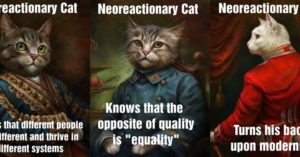Let’s start with the most theoretically minded, and probably most interesting, branch of the alt-right: the neoreactionaries.
In 2007, a writer with the pen name Mencius Moldbug (né Curtis Yarvin) started a blog called Unqualified Reservations. He proceeded to write essays that would inspire a whole movement of online political writers. The neoreactionaries drew inspiration from earlier paleoconservatives like Pat Buchanan and Joseph Sobran but with a tech-y twist. Moldbug, for one, is a veteran Bay Area programmer currently working on a startup he cofounded called Urbit.
And the core contention of Moldbug and the other NRx thinkers is one that’s been common in technolibertarian circles for a long time: Democracy is a failure.
“Democracy is — as most writers before the 19th century agreed — an ineffective and destructive system of government,” Moldbug writes. Moldbug doesn’t actually like the term “democracy.” He prefers “demotism,” or rule of the people, a label under which he sweeps modern-day developed democracies like the US or Western Europe but also the former Soviet bloc, Nazism, and fascism. “Universalist lawful democracy is the least demotist of demotisms, Demotism Lite if you will,” he writes. “Compared to Communism and Nazism, there’s much to be said for it. But this is a rather low bar.”
The purpose of government, in the view of neoreactionaries, isn’t to represent the will of the people. It’s to govern well, full stop. “From the perspective of its subjects, what counts is not who runs the government but what the government does,” Moldbug explains. “Good government is effective, lawful government. Bad government is ineffective, lawless government. How anyone reasonable could disagree with these statements is quite beyond me. And yet clearly almost everyone does.”
And democratic government, the neoreactionaries insist, is not effective, lawful government. Because the will of the people is arbitrary and varying, it cannot have the consistency of real. durable law, and it creates incentives for wasteful and, worse still, left-wing government. Moldbug started as an Austrian-school libertarian, and most neoreactionaries have general small-government sympathies and express a fear that democracy inevitably leads to ever greater taxation and redistribution, and otherwise encroaches on individual liberty.
“Democracy and ‘progressive democracy’ are synonymous, and indistinguishable from the expansion of the state,” Nick Land, the next most influential neoreactionary thinker after Moldbug, writes. “Since winning elections is overwhelmingly a matter of vote buying, and society’s informational organs (education and media) are no more resistant to bribery than the electorate, a thrifty politician is simply an incompetent politician, and the democratic variant of Darwinism quickly eliminates such misfits from the gene pool.” The result is a government that grows larger and larger.
Moldbug is even blunter: “Cthulhu may swim slowly. But he only swims left.”
This is a strain of thinking that more mainstream libertarians have expressed in greater and greater numbers of late. In 2007, George Mason economist Bryan Caplan argued in The Myth of the Rational Voter that democracy will inevitably lead to suboptimal economic policy because the general public is systematically biased against markets, increased productivity, and trade with foreigners. Peter Thiel, the libertarian billionaire who co-founded PayPal and Palantir and was the first outsider to invest in Facebook, declared in 2009, “I no longer believe that freedom and democracy are compatible.”
But while mainstream libertarians are outspoken about democracy’s deficiencies, they rarely propose an alternative. The neoreactionaries do: monarchy. Well, not monarchy specifically, but some kind of nondemocratic system with rule-driven succession. Moldbug likes to use the term “formalism,” or “neocameralism,” a reference to “cameralism,” the philosophy of government embraced by Frederick the Great of Prussia. Moldbug’s vision is corporatist, where instead of a nation belonging to a royal family, it belongs to corporation with shareholders to whom it is accountable. “To a neocameralist, a state is a business which owns a country,” he writes.
When asked who should lead it, Moldbug’s tech roots come through. “It’s easy to say ‘put Elon [Musk] in charge, he’ll figure it out,’ and he might well,” he tells me via email.

